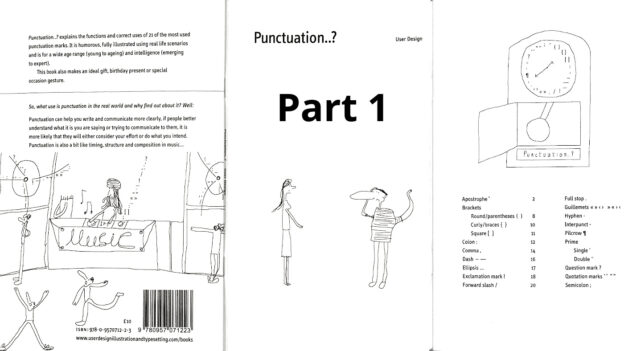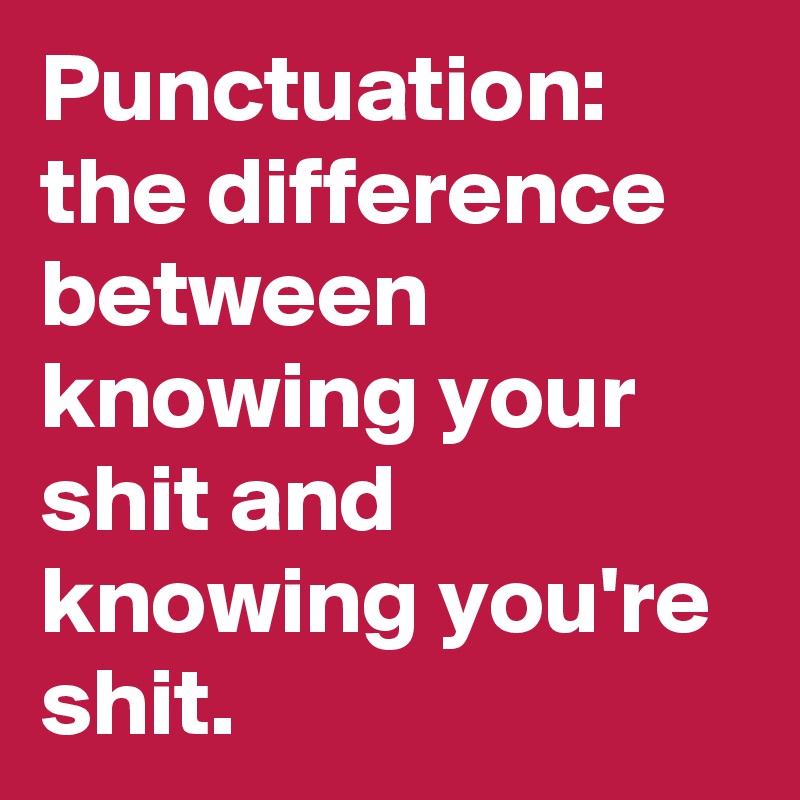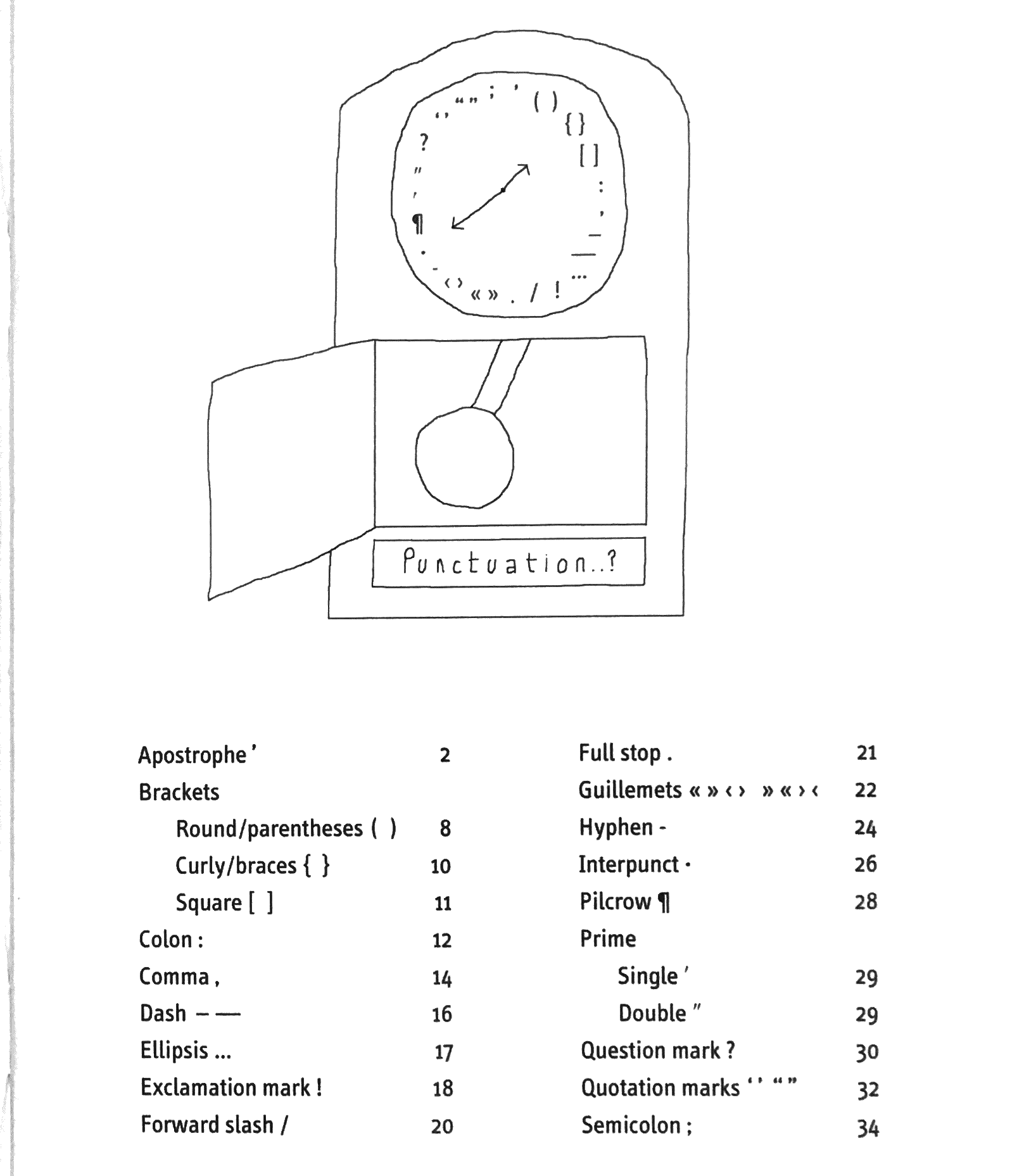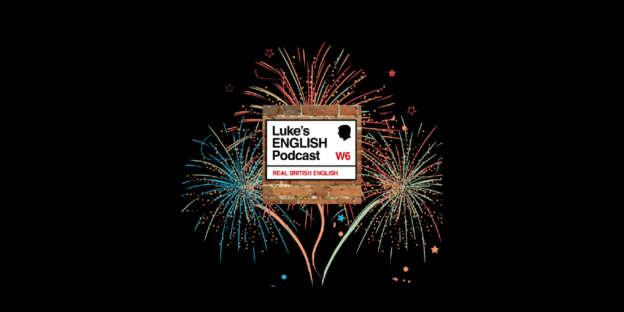Part 2 of my episode about punctuation. This one covers punctuation rules for apostrophe, full stop and comma. Also you can hear the rest of my book review of Punctuation..? by User Design. Transcript available below.
 [DOWNLOAD] [CAMBLY OFFER – USE CODE: TEACHERLUKE]
[DOWNLOAD] [CAMBLY OFFER – USE CODE: TEACHERLUKE]
Introduction
Hello there, you are listening to part 2 of this episode about punctuation. In the last one I talked generally about the importance of punctuation in various types of writing, described a book about pronunciation which has been sent to me for review by a publishing company and also I went through a list of punctuation symbols and described them so you know the names for a lot of the different punctuation marks available to you.
In this episode I’m going to actually teach you various punctuation rules relating to 3 big punctuation symbols.
So, I’m going to talk about how we use apostrophes and how to avoid certain common errors that actually make people’s blood boil, then I’ll give you some tips about full stops and commas. I’m also going to finish reviewing that book which I received in the post recently. It’s a punctuation guide and I’ll be giving my review of it.
Just before recording this I realised that there were some punctuation symbols which I didn’t mention in the last episode and I just want to say them now because you might not know the names we use in English for these symbols. These are ones we see on our computer keyboards and use quite a lot for various things like email addresses and stuff like that.
_ underscore
@ at mark
& ampersand
# hash
* asterisk or star
Alright, now I’ve mentioned those, let’s carry on with this episode with my comments about apostrophes, full stops and commas and then the rest of my review of the book Punctuation..? by User Design.
Just a reminder – you can find a transcript on the page for this episode on my website so you can read along with me or skim the script later in order to check for any new words. There are also links for the book and some pictures too. Right, let’s carry on.
Some punctuation rules
I don’t have time to go through every single punctuation symbol and explain their rules so I’m just going to focus on a few thing. To get the rest you’ll need to get a copy of this book or one of the others on the market. Other books are available of course.
Also I should say that usually, these days I do this kind of language teaching in my premium episodes. This time I’ve chosen to include this in a free episode, but if you want more of this kind of thing – episodes where I focus specifically on teaching you language then check out my premium episodes and become a premium member at www.teacherluke.co.uk/premium
I’m going to deal with
- The apostrophe (various uses)
- Full stop vs dot vs point
- Comma
I’ve chosen those because they’re really common and people, surprisingly, get them wrong quite a lot. Usually it’s learners of English who get full stops and commas wrong, and errors with apostrophes are common among native speakers. In fact errors with apostrophes make some people really angry. I’ll say more about that in a minute.
One thing to say here is that there is a certain amount of disagreement when it comes to punctuation rules. There isn’t a single agreed set of rules that everyone follows. Some things, yes, everyone agrees on, more or less. I think this includes certain basics like the rules of full stops and apostrophes. But for many other areas of punctuation there are always little points of disagreement, like for example some uses of the comma (The Oxford Comma debate comes to mind. I can’t go into that now though, because we’d be here all day! Just google it to get the full story, perhaps on a website like Grammarly).
https://www.grammarly.com/blog/what-is-the-oxford-comma-and-why-do-people-care-so-much-about-it/
So, be aware that there are some differences of opinion when it comes to style and the application of punctuation. The following information is correct as far as I’m concerned.
Apostrophe
This is not just a brilliant album by Frank Zappa, it’s also one of the most commonly used bits of punctuation, and this is a big one because people get it wrong all the time and it has a few different uses.
I’m paraphrasing from the Punctuation…? book here by the way.
Paraphrasing means taking information that you find in someone else’s work and then putting it into your own words, not copying it word for word, I mean changing the wording so that it’s not the same as before. In fact, paraphrasing really means reading someone’s words, understanding them and then writing the same concepts but using different wording.
Anyone writing essays at university should be well aware of the importance of paraphrasing so you don’t commit copyright infringement. This is a major issue these days because the internet allows people to copy & paste other people’s text so easily, but we shouldn’t do it. We shouldn’t pass off other people’s work as our own. I know that there are plenty of universities that are working on ways to seriously crack down on their students just ‘copy & pasting’ other people’s work into their own essays.
Having worked at a university here in Paris I have seen it done lots of times and I must say it really annoys me. It’s always blatantly obvious and, well, I just can’t stand it. For me the main examples were when I gave my university students presentation tasks to do and they literally just memorised a page from Wikipedia and then recited it to the class with absolutely no effort to even care about or think about what they were saying.
It just looks so terrible when people do that. It’s ok to take information from somewhere, just try to absorb it and then put it in your own words, and please, if you ever do a presentation at university or anywhere for that matter, just try to put some enthusiasm into your work, even if you’re worried about making errors in English. Sorry, I touched a nerve there in myself. Bad memories of some moments when I felt frustrated during my days of being an English teacher at university.
Anyway, for the record, I am paraphrasing the main points that are made by the Punctuation…? book here, with some other ideas of my own thrown in.
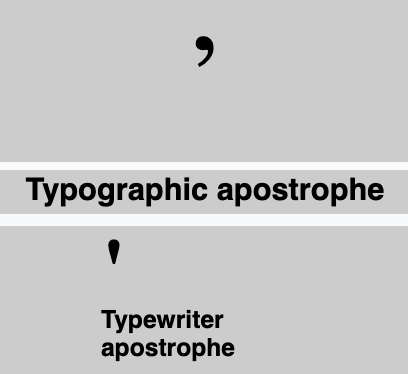 What’s the apostrophe?
What’s the apostrophe?
Think about the title of my podcast – Luke’s English Podcast. There’s an apostrophe in it. L U K E apostrophe S. That one shows a possessive. It’s my podcast. Luke’s podcast.
What does it look like, Luke? (can you repeat that question? haha)
It’s like a little dot with a tail that hangs in the air just to the right of a letter. In the case of possessives, that’s just before the letter S at the end.
It’s for possessives, but also other things. Here’s a list of situations when we use apostrophes.
Possessives
We use apostrophes with singular and plural nouns to show that one thing possesses another thing.
Here are some examples of possessives with singular nouns, in this case Dave is the singular noun.
“That is Dave and that is his car, just over there. Yes, that car belongs to Dave. That is Dave’s car. This is not Dave’s car. This is my car. My car is small, but Dave’s car is really big, unnecessarily big, some might say. I don’t know why he’s been driving such a massive car around the city. Now, as you can see, Dave’s car has crashed into my car. My car is now completely smashed up and will have to be thrown away at the junk yard. Dave’s car on the other hand, is relatively undamaged. So, Dave’s car is fine, but mine is completely smashed up. These are my hands. And this is Dave’s throat. Yes. I am strangling Dave. In my mind.”
Sorry, I got a bit carried away there! Don’t worry folks. It’s just an example. I don’t have a car and none of that ever happened, and anyway Dave’s dead now so it’s fine.
Just kidding.
Anyway, you saw lots of examples of the possessive apostrophe being used there.
You know this already, right? You should do.
We use an apostrophe to show possession when we’re dealing with singular nouns, like Dave. Dave is a singular noun (he’s also a single man, girls, if you’re interested in men called Dave who have large cars but can’t drive them).
It also works for things too, not just people. For example, the word car. “That car’s windscreen is completely smashed, whereas this car’s windscreen is somehow undamaged.”
That’s singular nouns. What about plural nouns, Luke?
What if both cars had their windscreens smashed in the accident?
As you know, plural nouns in English have S at the end. One car, two cars.
So what if you’re talking about the windscreens of two cars?
So, to add possessive S to a plural word which already has an S at the end (like CARS), what do you do? Do you add ‘apostrophe + S’ like with singular nouns? So C A R S ‘ S?
Nope, you can just add the apostrophe to the end, without the final S.
So it’s C A R S ‘
These cars’ windscreens are both smashed.
To be honest, if we’re not talking about a person I’d probably find another way of putting it. I’d probably say
The windscreens on these two cars are smashed.
What about plural names? For example if you have more than one bloke called Dave. Two Daves.
Actually, it’s rare that you have possessive forms of plural names.
It’s just weird to say something like “Daves’ cars crashed into each other” meaning “Dave and Dave’s cars crashed into each other”.
The point is – for plural nouns, whatever they are – people or things, with possessives you can just add an apostrophe.
This is also true for names that end in S, like James, my brother’s name.
You can write James’ Room. That’s J A M E S ‘ R O O M.
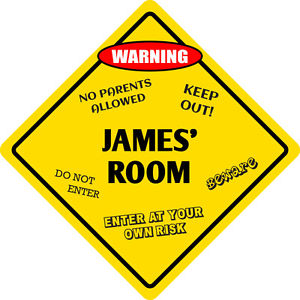 I remember that one because when I was a child, my brother and I had separate rooms and we had little signs on our doors. Mine said “Luke’s Room” with an apostrophe after my name and then an S. James’ sign said “James’ Room” with an apostrophe and then no S. I sometimes wondered why they were different. It’s just because James’ name ends in an S.
I remember that one because when I was a child, my brother and I had separate rooms and we had little signs on our doors. Mine said “Luke’s Room” with an apostrophe after my name and then an S. James’ sign said “James’ Room” with an apostrophe and then no S. I sometimes wondered why they were different. It’s just because James’ name ends in an S.
Fascinating stuff this, isn’t it?
For names ending in S like this you can also just write James’s Room. J A M E S ‘S R O O M.
How do you say that? James’ / James’s —-> /jeimziz/
So actually, for names it can be S’ or S’S.
So that’s possessives for singular nouns, plural nouns with S and names ending in S.
But what about irregular nouns? I mean, nouns where the plural form isn’t made with an S, like “children”.
One child
Two children
Well, we just do the same thing as we do with a singular noun.
So, “The children’s toys are in the bedroom”.
Other examples are things like “Women’s rights”, “The people’s champion” or “The Men’s changing room”.
A common error with apostrophes (Using apostrophes for plurals – don’t do it folks!)
This is a mistake that makes some native speakers get really annoyed.
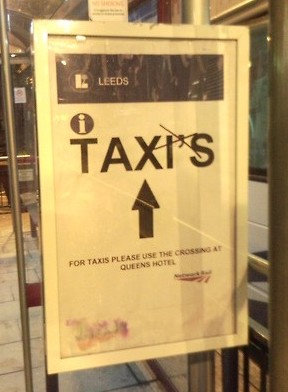
Sometimes in the UK you will see people use apostrophes just for normal plurals.
For example you might walk through a market and see a sign saying “Orange’s” or “Burger’s” or even “Fish & Chip’s”. Needless to say, there definitely shouldn’t be an apostrophe in those words. They’re just plurals of countable nouns. They’re not possessives and they’re not contractions of verbs.
Those kinds of errors are likely to make people’s blood boil!
If they know you’re a non-native speaker of English, that will make it a bit better, but still – don’t make the sort of mistakes that native speakers make, even if native-level English is what you’re looking for.
We’ll look at a couple of other common errors in a minute.
Apostrophes in contractions to indicate missing letters
Apostrophes are also used to let us know that some letters have been removed to make contracted forms.
Luke’s terrible improvised “joke” (?)
Just let us know when the letters have been moved from the lettuce.
(The words “let us” “letters” and “lettuce” sound really similar, that’s it. Terrible. Not even a joke.)
Apostrophes in contracted forms
Don’t → Do not
Doesn’t → Does not
I’ll → I will
Isn’t → Is not
Let’s → Let us
There’s → There is
You’re → You are
The book says that contracted forms are used for writing out speech, which is a good way of putting it. I’d add that these days we just use contracted forms in any kind of informal and neutral writing, but not in formal writing.
This use of apostrophes isn’t very complicated, is it? But it does cause one particular problem, which is it’s vs its
That’s the difference between the contracted form of it is and the possessive form of the pronoun it.
More common errors: It’s vs its
This is another thing that native speakers get wrong quite a lot.
Think of these two examples. Which ones should contain an apostrophe and which shouldn’t?
Obviously if you’re reading the script for this episode then you’ll be able to see the apostrophe with your eyes because it’s right there. But for those of you who are listening, in which sentence would you add an apostrophe after “it”?
- It’s a lovely day today!
- My phone has a crack on its screen.
I feel like I should join those sentences together to make one slightly sad sentence.
It’s a lovely day today, but my phone has a crack on its screen. :(
So, with an apostrophe “it’s” means “it is” or “it has” (like in present perfect).
Without an apostrophe it’s a possessive pronoun, just like my, your, our, their, his, her. My phone, your phone, our phones, their phones, his phone, her phone. None of them have apostrophes either.
We saw a lion and its paw was injured. (possessive pronoun)
Oh no, it’s (it has) injured its (possessive pronoun) paw!
Full stop (also called the ‘period’ in US English)
This one is really simple but it needs to be said because I’m surprised at how often I see missing full stops in students’ writing and also people using commas instead of full stops, incorrectly.
So I’m just going to say – put a full stop at the end of your sentence and a capital letter at the beginning of the sentence!
You don’t need a full stop if you have an exclamation mark or question mark.
How do you know when it’s a full stop and not a comma?
Well, if you’re using a new subject in a new clause without a conjunction (a joining word) to connect them, you need a full stop.
For example
I love cheese, but I can’t eat too much of it.
I love cheese. I can’t eat too much of it.
A basic example there, but there it is.
“Full stop” is a phrase that we use in spoken English to mean “And that’s the end of it! I am not discussing it any more” For example, “I don’t want to see any more smoking in front of the building, full stop!”
In US English they say “Period”.
“God damn it John. You’re a god damn maverick! I want your badge and your gun. You’re off this case. Period!”
“Full stop” is the phrase we use for the dot at the end of the sentence.
We also have other little dots in things like numbers and web addresses. What do we call them?
Dot
Use this in email addresses and websites. Teacherluke.co.uk
Also use it just to describe the shape – a small round mark is a dot, like on a pattered dress.
For example you might have a blue dress with white dots on it.
Also we use the word “dot” for the top part of the letter i or j and also to describe exclamation marks or question marks. It’s just the word we use for a tiny round mark.
Point
This is for numbers, meaning “decimal point”.
For example 3.14159 (Pie) Three point one four…
BBC headline: Women have 1.9 children on average, a record low – BBC News
One point nine children…
Comma
This is the most common punctuation mark in English. Basically, it’s used to make your writing clearer and to indicate some sort of pause in the rhythm of the sentence. We use them to separate items in a list.
For example, “Give me your clothes, your boots, your cigarettes, your Pokemon cards and your motorcycle”.
It’s also used when there is a change in the subject in your sentence. That’s something the Pronunciation…? book said and I think it’s really good.
For example
“I wanted to watch the new Avengers film, but Dave crashed into my car, so I couldn’t.”
There are more little uses of the comma, like the way they’re used in non-defining relative clauses or conditional sentences but to be honest I can’t go into all of those things now!
You’ll have to get a punctuation guide to get all the details.
Alright. This stuff can be hard to keep in your head, even when you already know it! That’s why you need a reference book to keep going back to. Explaining punctuation is not that easy, especially in an audio podcast, so why not use a book like this to save you the effort of working it all out for yourself, or doing loads of google searches and attempting to find consistent answers from different sources.
One thing I will say again is that there is some disagreement about the rules of punctuation and to an extent some of the application of punctuation symbols in your writing is a question of personal style and personal choice but some things are definitely right or wrong so the more you know the more control you’ll have and ultimately the better it will be for your English.
Book Review – Punctuation…? by User Design (continuing my review)
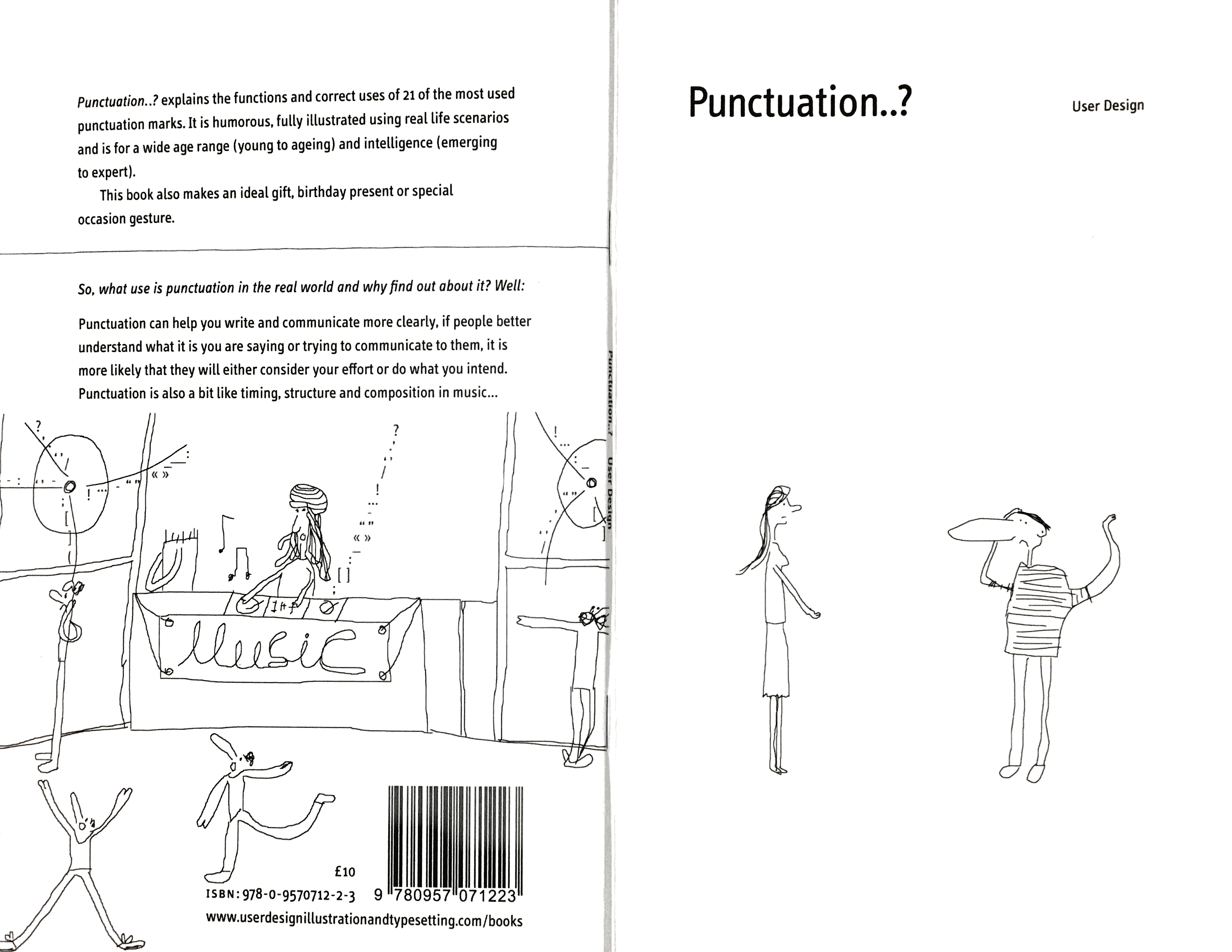
Punctuation..? by User Design (front and back covers)
There are a few books that explain punctuation that already exist on the market, but not that many that only deal with punctuation on its own.
Most of the time you’ll find punctuation guides inside other reference books like dictionaries (for example The Oxford English Dictionary) or grammar guides (like The Oxford A to Z of Grammar and Punctuation). As far as I can tell, the main book people buy when searching for a punctuation guide is The Penguin Guide to Punctuation. So, those things are the mainstream, well-known guides.
This book, “Punctuation…?” should be considered as an alternative.
So, let’s think about this book again. Remember how I described it to you earlier? Let’s go a bit deeper and I’ll give you my thoughts – both the negatives and positives.
I definitely like this book but I think it’s not 100% perfect. Let’s start with the negatives first. This is where I do some nit picking. Nit picking means making small criticisms or critical observations about something. Small criticisms that aren’t really all that important.
Well, perhaps some of these criticisms are important. We’ll see.
Negatives
The design aesthetic of this book is minimal, but it’s a bit too minimal in places, maybe. It doesn’t always give full reasons for some punctuation points and it feels like some things are lacking. For example, the page about colons. I had other questions which weren’t answered, like “Shouldn’t we put a capital letter after a colon? When do we use a capital letter after a colon and when do we not?” Those are questions which might be answered by more thorough and detailed punctuation guides or just by googling it. I sometimes feel there’s more to add, and I expect that in later editions of the book, if they publish them, there will be more details added, or at least I think there probably should be, without spoiling the minimal style of the whole book anyway.
So, yes, the book feels a little bit insubstantial, as if it needs more. For example, it could do with some pages of commentary, generally, about punctuation in general. The book covers each punctuation point succinctly and then it just ends. I would like some comments perhaps from the authors just explaining their process or perhaps giving some opinions about punctuation and style or something like that.
At first I thought that this feeling of “there’s something missing” was because of the minimal design with plenty of white space on the page and the cartoons which look quite sketchy, even if they are good fun. I thought it was just the effect of the design.
But in all honesty, it’s not just the way it looks, it’s also the content. Don’t get me wrong, the pages which are there are great and will definitely teach you good information about punctuation but it’s not really a full book. It’s more like a pamphlet, which is how it is described on Amazon.
The recommended retail price on the back of the book is £10, which is higher than other, more substantial books on punctuation which are available. I think that might be a bit of a sticking point for some customers. You’d expect the price to be a bit lower for the amount of content you’re getting.
Also, some of the examples are a bit weird, which can make them slightly confusing (“The snakes’ hisses”?)
Also, sometimes it’s not completely obvious to me what the connection is between the illustration and the punctuation point being explained. This makes it feel a bit like the pictures aren’t all that helpful beyond just creating a fun atmosphere – but is that what people want when using a punctuation reference guide? By all means, use humour and fun. Of course I believe in that strongly. I think it’s really important to help people to enjoy learning stuff like this but I also think that the fun stuff should be performing a function too and in this case some of the pictures don’t seem to make things clearer, some of them just seem a bit odd.
They’re idiosyncratic which is cool, but not always that helpful, and they might just make the guide somehow less serious, which I think is something people look for in a guide like this. Am I repeating myself? Probably.
This book is after my own heart. https://dictionary.cambridge.org/dictionary/english/after-your-own-heart
In summary, it might lack the seriousness and full commentary that some people expect from this kind of book at this kind of price, even though I like it.
Positives
One of the good things about this book is that it’s just a nice product to own. The paper it’s printed on is nice and thick and feels pleasant to touch. It has a pleasant-looking minimal design. The illustrations are quite fun and give the book more personality than your average dictionary or style guide. Also it would be more appropriate for young people I guess, or people who just want a bit more fun. It’s quite a good coffee table book, which makes it sound frivolous, but it is the sort of book you can enjoy flicking through, picking up some tidbits about punctuation that you might have always wondered about.
The explanations are short enough for you to digest quite easily. For example, there’s pretty much one rule or point per page. Punctuation rules can get pretty complicated but this book does a good job of reducing superfluous information. It gets straight to the point and as a result is very useful.
I said before that the book could do with some more commentary, like perhaps an introduction or conclusion, but on the other hand this book’s minimal approach makes it very accessible.
You will definitely learn things about punctuation by reading this book. Sometimes, very detailed language reference books become impenetrable because there’s so much information to sift through. Not with this book. They keep it short and simple.
Because it’s quite fun and a bit different while also being useful, I think it would be a good gift. You might not choose it in the bookshop if you want a no-nonsense language reference book, but you’d probably be happy to receive it as a present. I actually really like the book and I’m glad I have a copy. I learned a thing or two from reading it and it’s good to see some originality in this kind of reference work.
But it depends on the person I think. Some people might like this book because they will think it is a case of “Less is more”. I mean, some people will like the minimal style, will find the illustrations fun and will appreciate a more light-hearted feel but there are bound to be others who would just like more information, presented more seriously, please.
On the whole, I like the book. It’s original and quirky while also being useful and clear. It might not be the serious reference book that some people are looking for, but the information inside can definitely help you understand and improve your use of punctuation and ultimately that’s the main thing.
What did my wife think?
This morning I was having breakfast with my wife and the book was lying on the table. I pushed the book towards my wife and said, “what do you think of this book? Just give me your first impressions.” She said “I really like the pictures. I love this sort of thing. It looks really useful.” We agreed that it was actually a really cool book.
So if you’re looking for an alternative book about punctuation which has a more fun approach, get this book – either for you or as a gift. I think it’s particularly good as a gift for someone with a bit of a sense of humour, who is curious about punctuation and who also wants to be able to write more clearly.
The book seems to be available from all good bookshops including the main online retailers, certainly the ones which are well-known in the UK.
LINKS
User Design Website https://www.userdesignillustrationandtypesetting.com
Their books https://www.userdesignillustrationandtypesetting.com/books
The page for Punctuation…? Includes all the relevant information, including how to get the book https://www.userdesignillustrationandtypesetting.com/books/punctuation/index.html
Ending
I’d like to say thanks to User Design for sending me the book, and thanks to everyone out there for listening to this!
Owning a book on punctuation is a great idea. If you actually use it, you will see a definite improvement in your awareness of punctuation, which feeds into an overall sense of how you need to be clear when communicating, particularly in your writing.
So, I do recommend getting a punctuation reference book. Either this one, for the reasons I’ve given, or another one if this book isn’t your cup of tea.
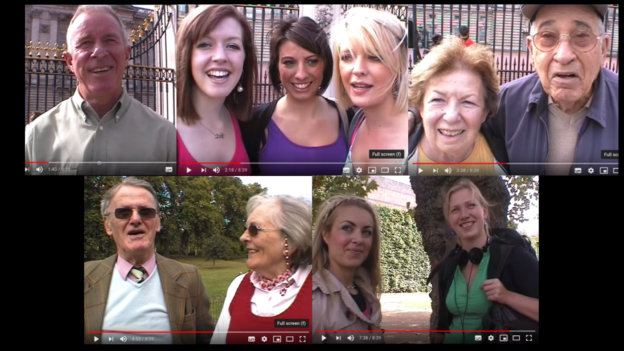

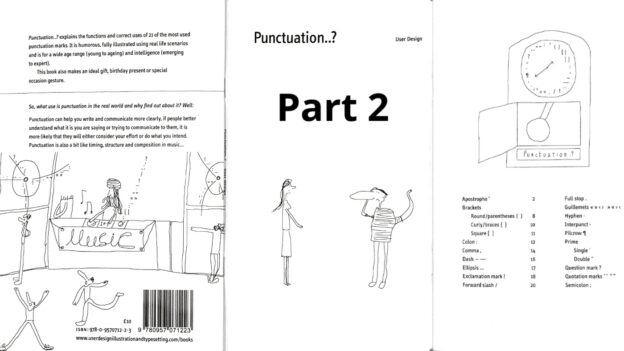
 What’s the apostrophe?
What’s the apostrophe? I remember that one because when I was a child, my brother and I had separate rooms and we had little signs on our doors. Mine said “Luke’s Room” with an apostrophe after my name and then an S. James’ sign said “James’ Room” with an apostrophe and then no S. I sometimes wondered why they were different. It’s just because James’ name ends in an S.
I remember that one because when I was a child, my brother and I had separate rooms and we had little signs on our doors. Mine said “Luke’s Room” with an apostrophe after my name and then an S. James’ sign said “James’ Room” with an apostrophe and then no S. I sometimes wondered why they were different. It’s just because James’ name ends in an S.

